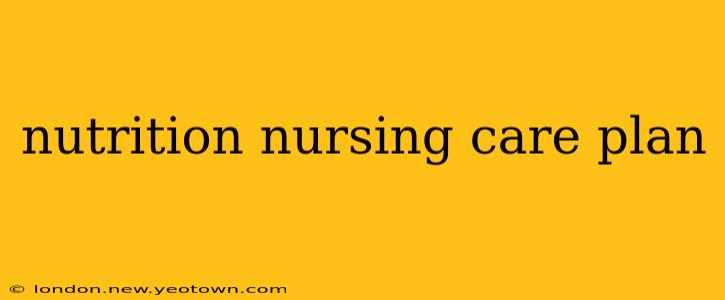Nursing care extends far beyond administering medications and monitoring vital signs. A crucial, often overlooked, aspect is providing comprehensive nutritional support. This is especially critical for patients recovering from illness, surgery, or managing chronic conditions. A well-crafted nutrition nursing care plan is the cornerstone of ensuring optimal patient outcomes. It's a personalized roadmap guiding nurses in addressing individual nutritional needs and promoting healing.
This isn't just about providing meals; it's about understanding the patient's unique situation, their dietary restrictions, preferences, and overall health goals. Think of it as a detective story, where you, the nurse, are piecing together the clues to unravel the patient's nutritional puzzle.
Assessing Nutritional Status: The First Clue
Before we even begin crafting a plan, we need to gather our evidence. This involves a thorough nutritional assessment, often involving several steps.
What does a nutritional assessment involve? This is a crucial first step in developing a comprehensive nutrition nursing care plan. The assessment considers various factors such as:
- Anthropometric measurements: Height, weight, BMI (Body Mass Index), and waist circumference help determine body composition and identify potential issues like malnutrition or obesity.
- Biochemical data: Blood tests (e.g., albumin, pre-albumin, hemoglobin) provide insights into protein status and overall nutritional health.
- Clinical examination: Observing for signs of malnutrition, such as dry skin, brittle hair, or muscle wasting, offers valuable visual clues.
- Dietary history: This involves a detailed discussion with the patient (or their family/guardian) about their usual eating habits, food preferences, allergies, and any dietary restrictions. We delve into specifics: what, when, and how much they eat.
- Patient's medical history: Underlying conditions, medications, and previous surgeries significantly influence nutritional needs. For example, diabetes requires careful carbohydrate management, while certain medications can affect nutrient absorption.
Identifying Nutritional Goals: Defining the Case
Once we've gathered our evidence, we can formulate specific, measurable, achievable, relevant, and time-bound (SMART) goals. These goals will guide our interventions. For example:
- Goal: The patient will increase their daily caloric intake by 200 calories within one week.
- Goal: The patient will maintain a stable weight throughout their hospital stay.
- Goal: The patient will demonstrate understanding of their prescribed dietary restrictions by the end of the education session.
These goals must always align with the patient's overall health goals and treatment plan.
Developing Interventions: Crafting the Solution
This section of the care plan details the specific actions nurses will take to achieve the defined goals. Interventions could include:
- Dietary education: Providing patients with clear information about their diet, portion sizes, and food choices.
- Meal planning assistance: Helping patients plan nutritious meals that meet their dietary needs and preferences.
- Nutritional supplementation: Recommending supplements if deficiencies are identified.
- Monitoring food intake: Tracking the patient's food and fluid consumption to ensure they are meeting their nutritional goals.
- Collaboration with a dietitian: A registered dietitian plays a crucial role in providing expert nutritional advice and developing individualized meal plans.
- Addressing swallowing difficulties (dysphagia): For patients with swallowing problems, modifications to food consistency and texture are essential, often requiring close collaboration with speech therapists.
Evaluating Outcomes: Reviewing the Results
Regularly evaluating the effectiveness of our interventions is key. This involves:
- Monitoring weight changes: Tracking weight fluctuations helps assess the effectiveness of nutritional interventions.
- Assessing appetite and food intake: Regularly assessing the patient's appetite and noting any changes in food intake.
- Reviewing laboratory results: Monitoring blood tests to assess nutritional status.
- Patient feedback: Obtaining regular feedback from the patient on their satisfaction with the care plan and any challenges they are facing.
Frequently Asked Questions (FAQs)
How can I help a patient with poor appetite improve their nutrition?
Encouraging small, frequent meals instead of large ones can be helpful. Making mealtimes more enjoyable by creating a pleasant atmosphere and involving the patient in meal preparation can also improve their appetite. Addressing any underlying medical conditions that may be contributing to poor appetite is also critical.
What are some common nutritional deficiencies seen in hospitalized patients?
Common deficiencies include protein, vitamin D, vitamin B12, and iron. These can result from reduced intake, malabsorption, or increased needs due to illness.
How do I document my nutritional assessment and care plan?
Detailed documentation is vital. This should include all aspects of the assessment, the established goals, the interventions implemented, and the evaluation of outcomes. Accurate documentation is crucial for continuity of care and legal reasons.
What is the role of a registered dietitian in nutrition care?
Registered dietitians (RDs) are nutrition experts who provide individualized dietary advice, develop meal plans, and manage nutritional deficiencies. Their expertise is invaluable in providing comprehensive nutritional care.
In conclusion, a well-executed nutrition nursing care plan is not merely a checklist; it's a dynamic process requiring ongoing assessment, adaptation, and collaboration. By embracing a holistic approach and prioritizing patient-centered care, nurses play a pivotal role in improving patient outcomes and ensuring their overall well-being.

